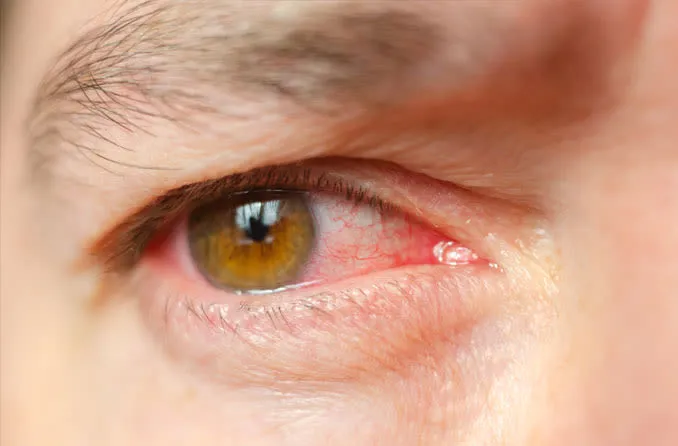Macular degeneration, medically known as age-related macular degeneration (AMD), is an eye disease that occurs due to the gradual loss of photoreceptor cells in the macula (yellow spot) of the retina, leading to central vision impairment. In affected individuals, vision loss begins in the center of the field of view and gradually expands outward. Patients often see a dark spot in the center while their peripheral vision remains intact, although blurred. Complete blindness does not occur, but visual quality declines significantly over time.
How Does Macular Degeneration Develop?
Macular degeneration is classified into two main types, which play a crucial role in diagnosis and treatment planning.
Dry (Atrophic) Macular Degeneration
- The most common type, affecting 85-90% of patients.
- Small yellow deposits (drusen) accumulate in the macula, disrupting the nourishment of retinal cells and leading to vision loss over time.
- The disease progresses slowly but can develop into geographic atrophy, causing significant vision loss in some cases.
Wet (Exudative) Macular Degeneration
- Found in 10-15% of cases but progresses more rapidly and severely than the dry type.
- Abnormal blood vessels form in the macula (choroidal neovascularization).
- These blood vessels can leak fluid and bleed, causing severe central vision loss.
- Symptoms include sudden vision deterioration, blurred or distorted central vision.
Juvenile Macular Degeneration (Stargardt Disease)
- A genetic form of macular degeneration that occurs in childhood or adolescence.
- Caused by mutations in the ABCA4 gene and inherited in an autosomal recessive pattern.
- Leads to early-onset central vision loss, difficulty distinguishing colors, and night vision problems.
What Causes Macular Degeneration?
The exact cause of macular degeneration remains unclear, but several risk factors contribute to its development.
Risk Factors
- More common in individuals over 65 years old.
- Higher prevalence in women compared to men.
- Family history of macular degeneration increases the risk.
- More frequently observed in fair-skinned and light-eyed individuals.
- Smoking doubles the risk of developing and worsening the disease.
- Obesity and poor nutrition accelerate disease progression.
- High blood pressure, high cholesterol, and vascular diseases impair retinal circulation, increasing the risk.
What Are the Symptoms of Macular Degeneration?
Macular degeneration progresses slowly and subtly in most cases, making early detection difficult. However, as the disease advances, the following symptoms may appear:
- Straight lines appearing distorted or wavy (e.g., seeing door or window frames as crooked)
- Loss of central vision (a dark or empty spot in the center of vision)
- Difficulty seeing in low light conditions and increased need for bright lighting
- Blurry vision and trouble focusing
- Difficulty recognizing faces or reading text
- Reduced ability to distinguish colors
Macular degeneration does not cause complete blindness, but severe central vision loss can occur in advanced stages.
How Is Macular Degeneration Diagnosed?
Early diagnosis is essential for slowing disease progression. The following tests help identify macular degeneration:
- Fundus Examination: Identifies yellow deposits (drusen) and potential retinal damage.
- Visual Field Tests: Detects blind spots and vision loss.
- Optical Coherence Tomography (OCT): Provides a detailed image of the retina to determine the type and stage of the disease.
- Fluorescein Angiography: Uses a special dye injected into the bloodstream to evaluate abnormal blood vessel growth in the retina.
Is There a Treatment for Macular Degeneration?
Currently, there is no complete cure for macular degeneration. However, various treatments can slow its progression and improve quality of life.
Treatment for Dry Macular Degeneration
- Nutritional Supplements: Antioxidants including vitamin C, vitamin E, zinc, copper, lutein, and zeaxanthin support eye health.
- Vision Rehabilitation: Use of magnifiers, special glasses, and low-vision aids.
- Telescopic Lens Implant Surgery: For advanced cases, a telescopic lens can be implanted in the eye to enhance central vision.
Treatment for Wet Macular Degeneration
-
Anti-VEGF Injections (Intravitreal Injections):
- Prevents abnormal blood vessel growth in the retina.
- Commonly used medications include:
- Ranibizumab (Lucentis)
- Aflibercept (Eylea)
- Bevacizumab (Avastin)
-
Photodynamic Therapy (PDT):
- A light-sensitive drug is injected into the bloodstream.
- A low-energy laser is applied to seal abnormal blood vessels.
-
Laser Photocoagulation:
- Uses high-energy laser beams to destroy abnormal blood vessels.
If wet macular degeneration is not treated early, central vision loss can rapidly progress.
How Can Macular Degeneration Be Prevented?
Since macular degeneration has no definitive cure, taking preventive measures is crucial.
- Eat a healthy and balanced diet:
- Consume omega-3 fatty acids, lutein, and zeaxanthin found in leafy greens, fish, and nuts.
- Wear sunglasses:
- Protect your eyes from UV rays to prevent retinal damage.
- Avoid smoking:
- Smoking damages retinal cells and accelerates macular degeneration progression.
- Get regular eye exams:
- Individuals over 40 should have a detailed eye check-up every year.
- Maintain cardiovascular health:
- Keep blood pressure and cholesterol levels under control to protect retinal health.









